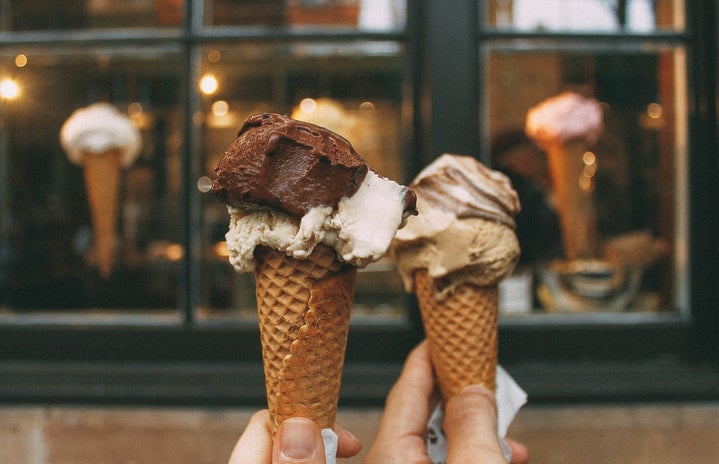Last month, I decided to get a head start on the typical New Year’s resolution fad diet and gradually stopped eating dairy. I didn’t have any expectations, but as I continued to refrain from milk products and learned about where our milk actually comes from, I was shocked at just how big of an impact it can make on our health and how quickly changes occur after cutting it out. Without any pretension or pressure, here are five reasons why removing dairy from your diet may change your life for the better:
- Dairy is not good for you. Like at all.
-
While genetically modified foods are no secret, milk-producing cows in the United States are treated with so many growth hormones that the resulting milk is banned in Europe (and Japan, Canada, Australia, New Zealand…). In order to increase yield, dairy farmers regularly inject their cows with recombinant bovine growth hormone (rBGH), causing the milk to have increased levels of a protein known to increase cancer risk in adults. Although milk does contain healthy nutrients, such as calcium and vitamin D, you’re also getting all the extra stuff that could have more detrimental effects in the long run.
- Contaminated milk could put you in contact with antibiotic-resistant bacteria.
-
As you can imagine, rBGH isn’t exactly good for the cows. Many of them develop a bacterial infection in the udders known as mastitis and need to be treated with antibiotics to continue producing enough yield. The bacteria then develops a resistance to the antibiotics and, during the milking process, can end up in the milk sold in stores. Ingesting antibiotic-resistant bacteria is obviously dangerous for your health, as it means the normal treatment for infections wouldn’t be as effective. There are protocols set in place to prevent contamination, but as the general public, we never really know what goes on, so it’s always better to be safe than sorry.
- Dairy may be the thing keeping your acne around – without it, your skin will rejoice.
-
The artificial hormones in your milk have the potential to throw off your natural hormonal balance, resulting in bad acne. Certain kinds of proteins found in milk, particularly skim milk, also cause inflammation and could be the culprit behind redness and rosacea. I was skeptical at first, but when I stopped eating dairy, the first thing I noticed was my skin clearing up. There hasn’t been a ton of research on the connection between dairy and skin health, but there are innumerable testimonies of people who have gone dairy-free and saw big results. Trust me (or them), and you won’t regret it.
- Your digestive system will appreciate it, too.
-
Simply put, cow’s milk is not well-suited for human consumption. I mean, why would it be? If you stop to think about it, cow’s milk is intended for calves, whose nutrient requirements and digestive systems are much different than ours. Regardless of lactose tolerance (or lack thereof), a lot of milk-based products will make anyone queasy. Excessive dairy is also linked to a slew of uncomfortable side effects, including indigestion, bloating, and nausea. Without having to work overtime breaking down large sugars and proteins, your digestive tract will thank you.
- There are so many alternatives nowadays! Making the change has never been easier.
-
We can’t ignore the fact that dairy-free alternatives can be costly, making it difficult for some people to adopt this diet. What we can say, though, is that these alternatives are more accessible now than they ever have been. It seems like Starbucks introduces a new type of milk every month, and many restaurants now offer dairy-free options and clearly label them on menus. I used to be a big parfait eater, and in my search to find a worthy replacement for my usual yogurt, I tried So Delicious’s coconut milk-based yogurt alternative and fell in love. Whether you’re looking for ice cream, cheese, or even butter substitutions, there is a wide selection of dairy-free products to choose from.
If going completely dairy-free is daunting, you can always ease into it! Start by removing something small, noting how your body reacts, and then you can keep going from there. Even small changes will impart beneficial effects on your health and overall well-being, so don’t be afraid to take the first step.



